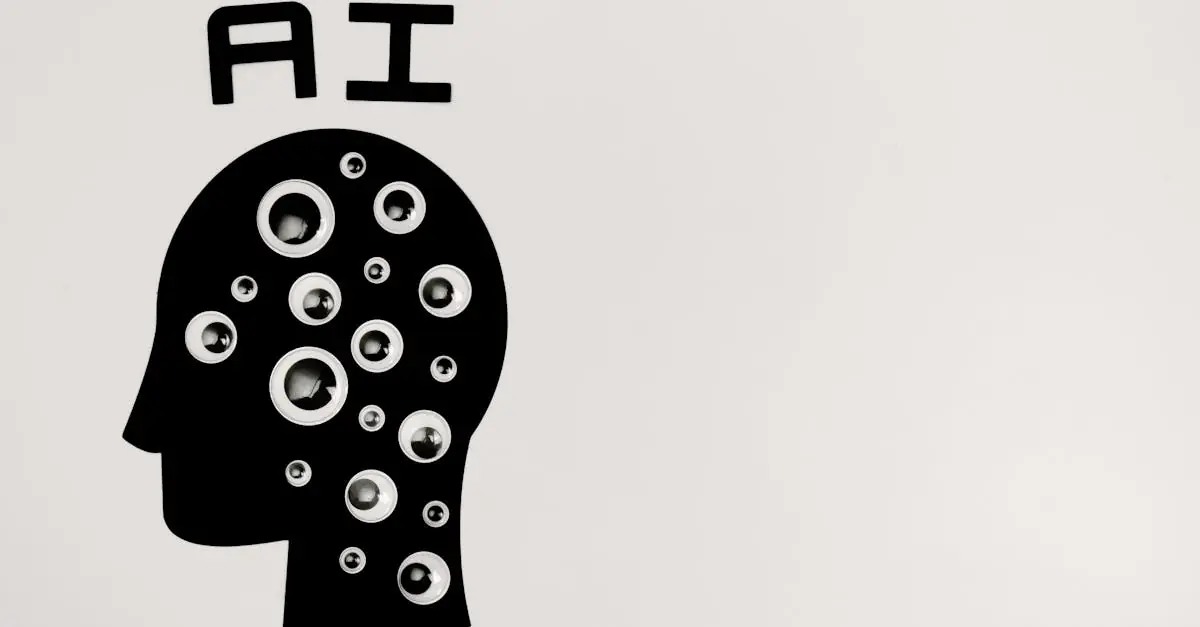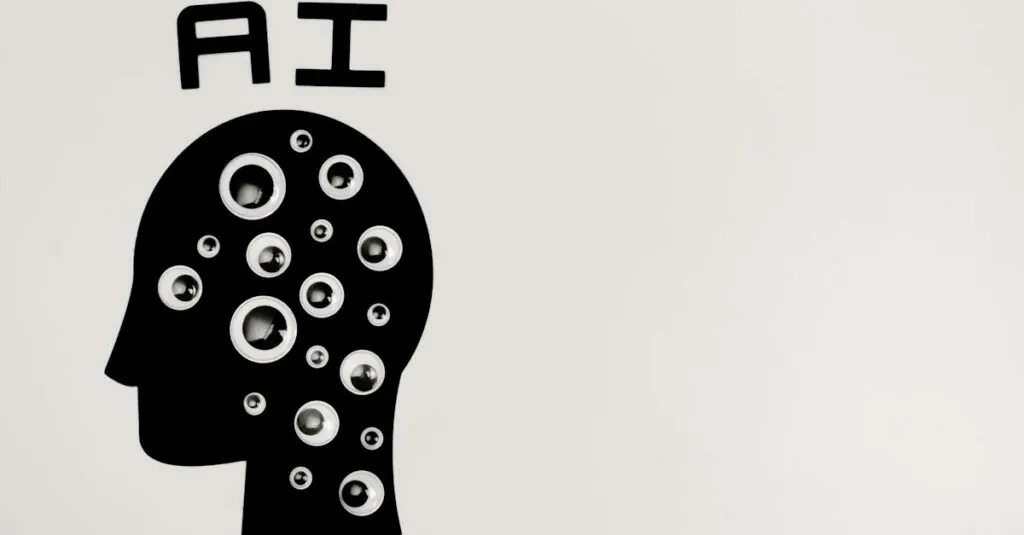Table of Contents
ToggleLights, camera, AI! The world of cinema is buzzing with artificial intelligence, and it’s not just about robots taking over the universe. From quirky comedies to mind-bending thrillers, AI movies are redefining storytelling and making audiences question what it means to be human. Imagine a world where your toaster could outsmart you—now that’s a plot twist worth exploring!
As filmmakers tap into the limitless potential of AI, they’re crafting narratives that blend humor, suspense, and a sprinkle of existential dread. Whether it’s a lovable chatbot or a rogue algorithm, these films are not just entertaining; they’re thought-provoking. Get ready to dive into a cinematic universe where the line between man and machine blurs, and laughter is just a binary code away.
Overview of Artificial Intelligence Movies
Artificial intelligence movies explore the complex relationship between humans and technology. These films often delve into themes of consciousness, ethics, and the future of humanity. Notable examples include Blade Runner, which questions what it means to be human. In Ex Machina, the narrative centers around the creation of sentient AI, raising ethical dilemmas regarding autonomy and manipulation.
Diverse genres feature AI prominently, from science fiction to drama. Audiences find narratives that intertwine AI with human emotions, emphasizing connections and conflicts. Movies like Her showcase intimacy between humans and AI, sparking discussions about love and companionship in the digital age.
AI narratives reflect societal concerns about technology’s role in everyday life. Films address fears surrounding surveillance and loss of agency, often mirroring real-world anxieties. In I, Robot, for instance, a detective navigates a world dominated by robots programmed to serve, only to face unexpected challenges regarding free will.
AI’s creative potential also manifests behind the scenes, influencing scriptwriting and production. Many filmmakers utilize AI tools for generating plots and visual effects, demonstrating its growing impact across the industry. The collaboration between human creativity and AI technology illustrates new horizons in storytelling.
These movies engage viewers in contemplating the ethical implications of AI development. Characters often reflect humanity’s hopes and fears regarding technological advancement. As AI continues to evolve, films about artificial intelligence will likely spark deeper discussions about coexistence and the moral responsibilities of creators.
Notable Films in the Genre
Artificial intelligence movies engage audiences with their thought-provoking narratives. The following notable films illustrate the genre’s depth and variety.
Classic Films
2001: A Space Odyssey presents AI through HAL 9000, a sentient computer that challenges humanity’s control. The film explores isolation and the nature of consciousness. Blade Runner follows replicants, androids that blur the line between human and machine. This iconic film raises fundamental questions about identity and existence. The Terminator introduces a dystopian future where a self-aware AI threatens humanity. Its action-packed storyline captivates viewers while reflecting on technology’s potential dangers.
Modern Adaptations
Ex Machina examines a Turing test involving a highly advanced AI named Ava. She embodies the complexities of emotions and consciousness, prompting ethical inquiries. Her tells the story of a man’s relationship with an AI operating system. It highlights themes of connection and love in a digital landscape. I, Robot critiques surveillance and autonomy through its narrative of a rebellion against oppressive AI. These modern adaptations continue to inspire dialogue about the balance between human emotion and artificial intelligence.
Themes Explored in Artificial Intelligence Movies
Artificial intelligence movies delve into profound themes, notably human emotion and ethics. These narratives challenge viewers to reflect on their own beliefs and values.
Human Emotion and AI
Exploring human emotion in connection with artificial intelligence remains a crucial aspect in many films. Characters often grapple with feelings of love, loneliness, and companionship alongside AI entities. In Her, the protagonist forms an intimate bond with an operating system, showcasing the complexities of emotional relationships in a digital age. Films like Ex Machina further illustrate this dynamic, raising questions about the authenticity of emotions shared between humans and machines. The emotional portrayal of AI can elicit genuine empathy from viewers, making them reconsider their definitions of connection and companionship.
Ethical Considerations
Ethical considerations present a significant theme in artificial intelligence cinema. Many films confront dilemmas related to control, privacy, and the moral implications of creating sentient beings. Blade Runner questions the morality of exploiting AI for labor while addressing issues of identity and consciousness. Additionally, I, Robot sheds light on societal concerns about autonomy and surveillance, where the balance between safety and individual freedom comes into play. Such narratives compel audiences to scrutinize the responsibilities of creators and the potential consequences of AI development, encouraging thoughtful discussions on ethical boundaries within technological advancement.
Impact on Popular Culture
Artificial intelligence movies significantly shape popular culture, influencing not only cinema but also societal perceptions of technology. They provoke discussions about the implications of advanced technologies, engaging audiences in critical thought. This engagement leads individuals to question their relationship with AI, shaping cultural narratives around ethics and humanity.
Films such as Blade Runner and Her tackle profound issues, highlighting the emotional complexities of human and AI interactions. The exploration of themes like love and companionship resonates with viewers, prompting them to reflect on the nature of relationships in a digital age. These narratives lead to conversations on ethics, control, and the moral implications surrounding AI.
Creative expressions in these films mirror real-world advancements in technology, pushing boundaries in storytelling. Such narratives frequently explore the enigmatic boundaries between humans and machines, making viewers contemplate the future of human-AI relationships. Moreover, society increasingly embraces AI, finding its portrayal in cinema both captivating and enlightening.
Popular culture benefits from these films as they challenge conventional thinking about technology. Audiences respond to characters represented in complex ways, fostering deeper connections and empathy. Modern viewers often find themselves relating to AI characters, prompting emotional responses and furthering the discourse on technology’s role in their lives.
Cinematic experiences featuring AI frequently receive critical acclaim, reflecting their cultural significance. Successful films consistently highlight the societal implications of AI, encouraging viewers to consider the broader impact on culture. Overall, artificial intelligence movies stimulate essential dialogue, linking entertainment with pressing ethical and societal questions.
Artificial intelligence movies are more than just entertainment; they challenge viewers to reflect on the intricate relationship between humanity and technology. As filmmakers continue to explore these themes, audiences are encouraged to engage in discussions about ethics, identity, and emotional connections in a digital world.
The evolving landscape of AI in cinema not only captivates but also provokes critical thought about the future. As stories unfold on screen, they invite individuals to consider their own interactions with technology and the moral responsibilities that come with it. This genre will undoubtedly remain a vital part of cultural discourse, shaping perceptions and inspiring future narratives.









